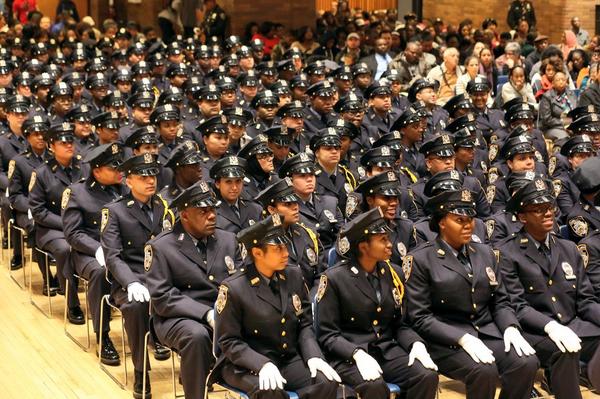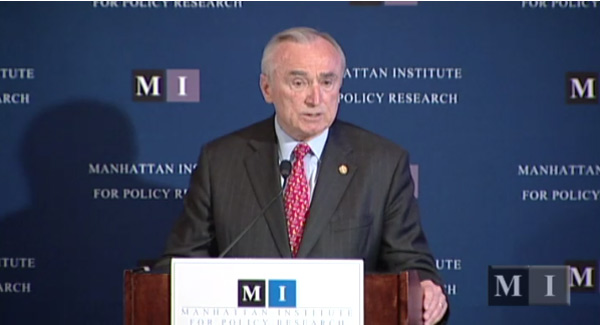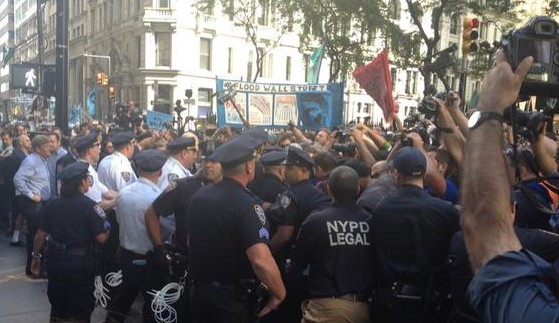De Blasio's New Progressive Criminal Justice Initiatives Overshadowed by Prospect of More Police

New school safety agents (photo: @CommissBratton)
In the last week the de Blasio administration has announced three new initiatives designed to reduce some of the negative consequences of over-relying on criminal justice solutions to solve community problems. If his administration is serious about moving in this new direction, they need to come out against hiring additional police in next year's budget.
Last week it was announced that New York was planning to adopt aspects of Seattle's Law Enforcement Assisted Diversion (LEAD) program, designed to divert low level offenders from the criminal justice system and into treatment and training programs. Seattle's program relies on officers to refer those they come into frequent contact with in relationship to drugs and prostitution. These are typically repeat offenders who regularly cycle in and out of jails, emergency rooms, and courts at great expense to the city and with only limited and temporary public benefit. Unfortunately, the new plan as conceptualized here is limited to non-arrestable violation offenses, undermining a key source of savings and possibly subjecting people to additional criminal justice involvement over minor offenses.
Hopefully this is just the warm up to a more comprehensive effort to deal directly with the myriad of social problems facing this difficult population.
Next, the mayor announced that he was ordering a major overhaul of school disciplinary procedures. This is great news for anyone who has been following the failed national trend of criminalizing young people through a growing number of zero tolerance policies. Since the NYPD took over school security, the number of young people arrested, cited, and suspended has increased dramatically. While this policy change does not directly affect NYPD school safety officers, it sends a message to school officials that they need to take greater responsibility for managing school safety without relying on ever more punitive measures. A recent report by a task force put together by former New York State top Judge, Judith Kaye, showed that well-trained principals in even the most difficult to manage schools have been able to dramatically reduce suspensions and arrests without undermining student safety.
Finally, the Department of Corrections announced a new policy this week that would end the use of solitary confinement for juveniles on Rikers Island. During a recent visit I made to Rikers I saw that almost 20% of juveniles were held in solitary conditions and in the process denied access to educational programs. A growing body of research has shown that solitary conditions are especially traumatic for juveniles and may serve to make them more violent and socially withdrawn upon release. This is a major positive development, leading some, like Council Member Elizabeth Crowley, to call for removing juveniles from Rikers altogether given its entrenched culture of violence.
All of this stands in stark contrast to last month's announcement by Police Commissioner Bill Bratton that in next year's budget cycle he intends to ask for at least 1,000 additional police officers. This would be a major step in the wrong direction and if included in the mayor's budget, would substantially undermine his claims of progressive criminal justice reform.
While the NYPD has an important part to play in creating social stability, its role has been dramatically over-extended in the last two decades. With the expansion of the War on Drugs and the adoption of Broken Windows-based policing, the NYPD has taken on a wide variety of tasks that it is not particularly well-suited for.
Despite decades of intensive anti-drug policing, which has given hundreds of thousands of mostly brown and black people criminal records, the NYPD has few victories to point to. While it's true that open air drug markets have been reduced through intensive criminalization, drugs are just as easily obtained as ever. Any high school student in New York can easily obtain any drug they choose. Overdose rates and other health problems associated with drug use have shown no signs of improvement either. It's time to take police out of the drug business and turn it over to public health officials. Decriminalization of drugs in parts of Europe has been a huge success leading to lower crime and better health outcomes. The full legalization of marijuana as in Colorado and Washington would be a start.
Despite the claims of its supporters, there is little to no academic evidence that Broken Windows policing has made us safer or is worth the high cost of criminalizing hundreds of thousands of mostly non-white New Yorkers every year. Yes, it can be used to drive out a homeless encampment or get rid of squeegee men, but it is not the reason for a multi-decade international crime drop that has occurred in hundreds of cities that never practiced it. It's time that we stopped criminalizing poverty and disorder and found more effective and less costly ways of improving the quality of life of all New Yorkers. Major investments in affordable housing, adequate mental health services, and meaningful employment opportunities are the humane, just, and cost effective ways of moving forward.
Some will dismiss this advice as a soft-hearted liberal appeal for more social spending. The evidence, however, is clear that we cannot police or incarcerate our way out of the social problems facing the city. And, even if we could, we can no longer afford the implications for racial and economic inequality that undergird such an approach. This administration understands this reality and needs to quit trying to have it both ways. It's time to double down on alternatives to criminalization.
***
Alex S. Vitale is associate professor of sociology at Brooklyn College and author of City of Disorder: How the Quality of Life Campaign Transformed New York Politics. He is senior policy adviser to the Police Reform Organizing Project and serves on the New York State Advisory Committee to the US Civil Rights Commission. You can follow him on Twitter at @avitale.
Bill Bratton, Robert Peel, and Today's Police

NYPD Commissioner Bill Bratton speaking at a Manhattan Institute event
New York City Police Commissioner William Bratton often refers in public to his hero, Sir Robert Peel, a 19th century Englishman who espoused a community-oriented policing philosophy. The nine Peelian principles include such views as:
- The ability of the police to perform their duties is dependent upon public approval of police actions.
- Police must secure the willing cooperation of the public in voluntary observation of the law to be able to secure and maintain the respect of the public.
- Police seek and preserve public favor...by constantly demonstrating absolute impartial service to the law.
Peel's principles make no reference to a law enforcement approach resembling the "broken windows" theory promoted by Mr. Bratton, that a focus on low-level infractions like jaywalking, spitting on the sidewalk, or holding an open alcohol container will lead to a reduction in serious violent offenses. Nor does Mr. Peel mention the kind of numbers-driven policing that characterizes so much of the activity of NYPD officers.
I wonder what Mr. Peel and, in fact, Mr. Bratton would think about my recent conversation with a current New York City cop. While making a deposit at a bank near my office, I overheard the police officer posted there explaining to two tellers what the cops responsible for Eric Garner's death did wrong.
Interested in hearing more of his specific thoughts, I asked what he would have done differently. "First," he said, "you take your time and talk, your initial steps to persuade the guy to think better of sticking with his first impulse which is to object to the arrest. 'We can do this the easy way,' you say, 'or we can do it your way.' Then you explain that you have backup and that 'it won't be a fair fight, it's never a fair fight.'"
In addition, the officer explained, "you always take it very seriously when the person says something like 'I can't breathe', even if you think he's faking it. It's too dangerous not to."
I commented that it was especially troubling that the infraction involved, selling loose cigarettes, was so minor. "You know," the officer responded, "I'll be honest with you" -- a phrase that he repeated twice during our conversation -- "there are quotas. Each precinct has a conditions squad and they're under pressure to make their numbers. Arrests or tickets for quality of life things."
At this point in our back and forth, he was talking freely. Some of his other revealing thoughts and comments included:
-Quotas for evaluating police performance are 'unwritten', but each precinct has them and they are different for each neighborhood. So the numbers that the 'higher ups' expect you to meet are higher say, in Harlem, where he used to work than in Midtown Manhattan where the bank is located.
-"It is easier to arrest a black or brown kid" in Harlem. He stated that he would not under any circumstances arrest an Orthodox Jewish person from Brooklyn, where he also used to work. "They will make a cop's life miserable," he said, because they're well organized and can draw on their political connections.
-Once, due to an urgent family situation, he asked for an unplanned day off. "Like to help you out," his supervisor said, "but I have to check on your activity." 'Activity' is a code word for arrests, summonses, and stops; in other words, the officer would qualify for the day off only if he had met his quota.
-When I asked whether the quota system within the Department credited officers for positive activities like breaking up fights, settling disputes, or directing people in need of services like the homeless or mentally ill to places that offer appropriate services, he said no, only for sanctions like 'collars' or tickets.
-He said that sometimes you can see the trail for "quality of life" directives, pressure from headquarters to borough commanders, precinct captains to lieutenants, and sergeants to cops on the street.
-"I became a police officer because I wanted to help people," he said, "but the job doesn't support it." He shook his head. "I want to do the right thing but I'll get hanged for it."
I do not know exactly what "I'll get hanged for it" means here. I am fairly certain, though, that the officer referred to an on the ground culture within today's NYPD that is antagonistic to activities aimed at helping or befriending members of the community. I am also fairly certain that Mr. Peel and, for that matter, Mr. Bratton would not approve of such a police department. The key challenge for Mr. Bratton and for his boss, Mayor Bill de Blasio, and for all New Yorkers is how to create an NYPD that actually adheres to the "Peelian" principles and that fosters an institutional environment that rewards rather than intimidates officers who seek a constructive relationship with the people whom they are sworn to serve and protect.
***
Robert Gangi is the director of the Police Reform Organizing Project (PROP). Find PROP online at its website and on Facebook and Twitter.
Jury Still Out On De Blasio Era Protest

Protestors and NYPD during 'Flood Wall Street' (photo: Azi Paybarah)
The de Blasio administration's handling of the People's Climate March and Flood Wall Street protests has been widely praised by many leading critics of the NYPD.
On Sunday, NYCLU head Donna Lieberman tweeted that the non-confrontational approach taken by Bratton's forces was "#change we can believe in." And writing in Gotham Gazette Tuesday, Brooklyn College professor Alex Vitale suggests that the improved relations between the NYPD and protesters at both Sunday and Monday's events meant that "the First Amendment scored a major victory this week."
But in the spirit of that same amendment, I shall dissent.
Consider the intended locations of both events. Organizers of the People's Climate March sought to make their statement in Times Square, not on the streets surrounding it. And as the name alone indicates, "Flood Wall Street" was neither aimed at lower Broadway, nor the entire financial district.
Forcefully manned NYPD barricades ensured that no demonstrators would gain access to either iconic location during this week's protests.
While some may be tempted to cue up a certain Rolling Stones song, others may wonder about the precedents now set. The next time protest organizers seek access to Times Square, city officials can point to the ill-defined Climate March route as an established alternative.
Vitale suggests that the NYPD may seek for it to be an "apolitical" place, but Times Square does remain public space. At the height of the Occupy Wall Street movement in October of 2011, police allowed a march route from Washington Square to the edge of Times Square, knowing that activists would seek confrontation there.
While it was indeed surprising that Monday's Occupy-style event led to the shutdown of lower Broadway, most observers paid little attention to the fact that Wall Street itself was barricaded throughout the day. If the NYPD allowed a lunch-hour sit-in on Wall Street, that likely would have been less disruptive to business as usual in the area than letting activists control a major artery throughout the entire afternoon.
Both protests thus illustrated the NYPD's growing insistence on insulating the city's most "sacred" spaces from political demonstrations. Is this really a victory for the 1st amendment?
It's also a mistake to see these two events as clearly establishing a definite pattern. After all, as veteran Occupy organizer Stefan Fink told Al Jazeera, they occurred precisely as the "eyes of the world" were on New York City.
Mayor de Blasio was one of the many leading political figures who took part in the Climate March, and he was also slated to address the U.N. climate summit the following day. A hostile approach to a climate change demonstration was clearly not in his best interest.
The mayor's noble proclamations about the 1st amendment also need to be read against the backdrop of his own arrest in the effort to save Long Island College Hospital last year. Many now see that as simply a campaign stunt, but it also makes it hard for the mayor to object to direct action.
Finally, given his lack of leadership on other ongoing policing controversies, a gentler approach to protest also may benefit the mayor politically, since it may calm activists' ire.
Thus, while this week's events indeed suggest a "change" in the climate of protest, it's wiser to reserve judgment until the next large demonstrations take shape—on whatever street they may arise.
***
Theodore Hamm (@HammerDaily) is chair of journalism and new media studies at St. Joseph's College in Clinton Hill, Brooklyn.




